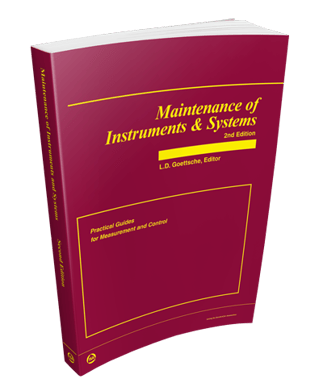AutoQuiz is edited by Joel Don, ISA's social media community manager.
This automation industry quiz question comes from the ISA Certified Control Systems Technician (CCST) program. Certified Control System Technicians calibrate, document, troubleshoot, and repair/replace instrumentation for systems that measure and control level, temperature, pressure, flow, and other process variables. Click this link for more information about the CCST program.
When a controller that possesses integral action receives an error signal for significant periods of time, the integral term of the controller will increase at a rate governed by the _______(1)_______. This will eventually cause the manipulated variable to reach 100% (or 0%) of its scale, i.e., its maximum or minimum limits. This is known as ______(2)_______.
The best answer set to fill in the two blanks labeled (1) and (2) above is:
a) (1) offset; (2) integral wind-up
b) (1) integral time of the controller; (2) integral windup
c) (1) sample time of the controller; (2) integral start
d) (1) integral time of controller; (2) derivative time
e) none of the above
Answer A is incorrect since the offset is not related to the integral action of a controller on error. Answer C is incorrect because sample time and integral start are not directly responsible for the increase or decrease in controller output calculated by the integral action term in the PID equation. Answer D is incorrect because the derivative time is not the result of saturation of the integral term of the controller at a controller limit.
The correct answer is B, (1) integral time of the controller; (2) integral windup. The integral term of the PID control algorithm increases (or decreases) at a rate inversely proportional to the integral time of the controller. Because of the feedback nature of the PID algorithm, as long as an error exists, the controller output will increase or decrease until it reaches a high (100%) or low (0%) limit. This is known as integral (or reset) windup. If a controller is outfitted with an anti-reset windup feature, the output will hold at the high or low limit. If not, the calculated output of the controller can continue to "wind up" or "wind down" beyond those limits.
Reference: Goettsche, L.D. (Editor), Maintenance of Instruments and Systems, 2nd Edition

About the Editor
Joel Don is the community manager for ISA and is an independent content marketing, social media and public relations consultant. Prior to his work in marketing and PR, Joel served as an editor for regional newspapers and national magazines throughout the U.S. He earned a master's degree from the Medill School at Northwestern University with a focus on science, engineering and biomedical marketing communications, and a bachelor of science degree from UC San Diego.




